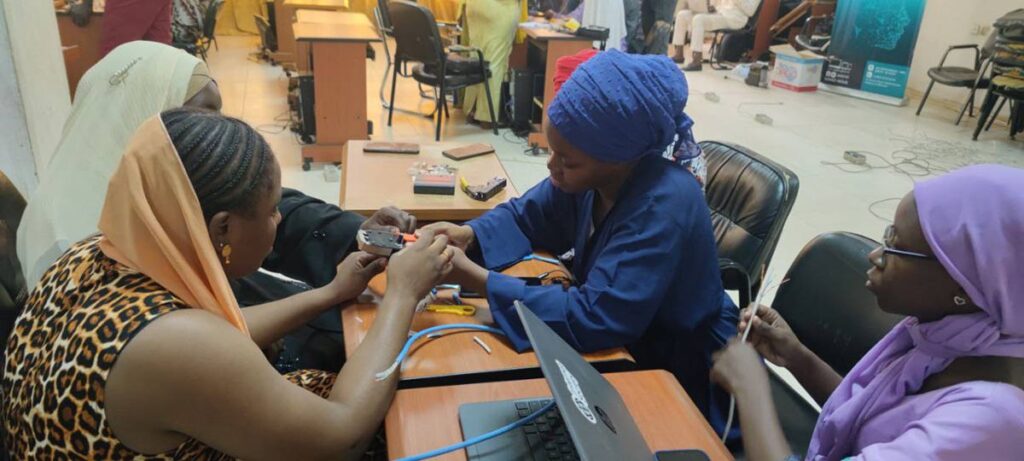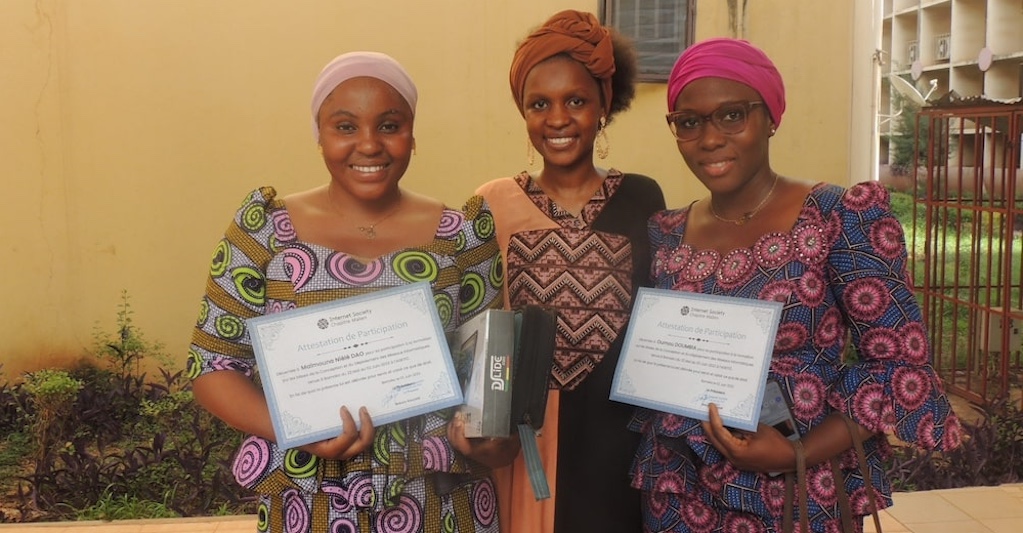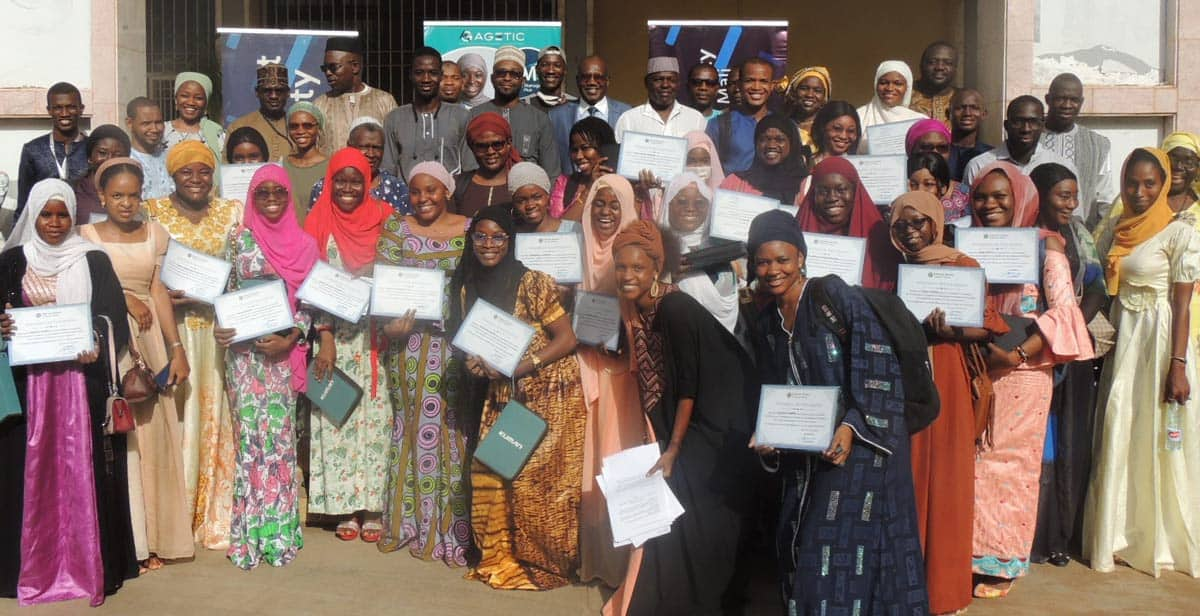Aminata Hélène Dackouo hurried along Bamako’s hot, dusty streets one morning in May 2023, intent on reaching her destination in time. Her heart raced, and she had butterflies in her stomach—she was about to ask a very important question, and the answer would significantly impact her future.
Just a week earlier, she’d seen a post on social media about a hands-on computer networking course for young women run by the Internet Society. She’d known right away it was for her. Aminata was about to receive a degree in industrial and computer engineering but still lacked the practical experience necessary to find a job. If she was accepted into this course, it could change her life. While shy around new people, she knew this was a chance she had to take. She applied for the course, hoping there was still time for her application to be processed.
She suspected it might already be too late—the course was in high demand, and many others had applied before her. So, a couple of days later, when the course was due to begin, Aminata gathered all her courage and went to the Internet Society’s Mali Chapter office. Bakary Kouyate, the chapter president, greeted her with a smile. There was still a spot, and Aminata could have it. She thanked him, relief washing over her. She buzzed with excitement as she made her way to the classroom.

Hands-On Training for Young People is Opening Doors
In 2022, to empower the next generation of Internet champions, the Internet Society developed Fundamentals of Digital Deployment of Computer Networks (DDCN), a six-week course offered in English, French, Spanish, and Arabic. Designed for young people with basic knowledge of computer hardware and software, the course was piloted in Kenya that same year and then rolled out in Mali in 2023. And as Aminata and her classmates have shown, it’s already proving to be a force for good.
Oumou Doumbia, who has an electronics and global communications MA, also took the course. “The practical aspect is lacking at our universities in Mali, even though it’s required to gain employment,” she said. “You can get all the diplomas you want, but without hands-on experience, you might not find a good job. The DDCN course fills this gap by allowing you to practice what you’ve learned.”
Far from the typical classroom experience, the DDCN course is a deep dive into the world of networking, from ethernet and Wi-Fi technologies to network planning, troubleshooting, and more. Under the guidance of industry experts, participants explore network components and how they work and discover how to resolve common maintenance issues.
Best of all, participants get to immerse themselves in the enjoyment of applying what they know and configuring devices they’ve previously only read about.
“Learning how to operate and configure routers directly was so satisfying since it was completely new to me,” Aminata said. “Seeing all those cables in person for the first time was thrilling.”
The Benefits of In-the-field Training
The course has had a positive impact on more than one level. In addition to enabling these participants to acquire career-changing technical know-how, it also boosted their confidence
“Before DDCN, I was nervous about speaking up in public,” said Pinda Bassirou Traoré, who came to the course with a degree in telecommunications networks. “But the trainers were very encouraging, and while I was afraid to answer questions at first, they were so supportive that I grew more self-assured over time.”
In Oumou’s experience, the ambiance among the students and trainers was welcoming. “We were like family during the training,” she said.
As for Aminata, her fears soon disappeared. “In the beginning, I was pretty withdrawn. But this course was a professional and personal gain for me because I learned how to be more comfortable with others and confident in expressing myself.”
The course also builds teamwork skills. “I wasn’t used to working with others and always felt I was more of an introvert,” Pinda said. “But during this course, I learned how to be more outgoing, relaxed, and happy because we were having a great time learning together.”

New Opportunities and New Internet Advocates
Conduits of growth, knowledge, and community, courses such as this open doors for long-term investment in the future of the Internet through better job opportunities for its participants. All three young women were able to move ahead in their careers as a direct result of this training. Oumou now works as a technician at a telecommunications company. Aminata and Pinda each secured an internship—at a tax and financial IT support unit and a video surveillance company, respectively.
“Before DDCN, I lacked real experience and wasn’t fully qualified for the career I wanted, even though I had a degree,” said Pinda. “As soon as I added the DDCN course certificate to my CV, I landed an internship at a firm that does a lot of camera installation and configuration—which I now had practical experience with, thanks to the course.”
People who complete the course are better positioned to build and protect the open, global Internet. They also become beacons of knowledge in their local communities, expanding horizons and making sure that no one is left behind.
Such outcomes will be particularly welcome in Mali, which, according to an Internet Society country report, falls below the regional median for Internet performance, resilience, and provider diversity. These and other factors are key to growing and sustaining the Internet, which, in turn, help drive innovation and a brighter future for all.
Today, Aminata is no longer the same shy, inexperienced young woman who went to knock on a door one fateful spring morning.
She completed her internship at the end of December. “I feel so much better about my prospects now. If I hadn’t taken the DDCN course, I truly would have lost out big time. I’m so happy to now have what employers are looking for—practical experience!”
In conjunction with taking the course, several participants mentioned joining the Internet Society’s Mali Chapter to take advantage of everything membership offers. “I’ve already participated in many other activities and training since the DDCN course,” Aminata said. “I’ve even been able to do some public speaking—something I was terrified of before but have now learned to enjoy.”
Learn more about how to gain practical, hands-on knowledge and bolster your career. You can choose from a full suite of free moderated online, face-to-face, and self-paced tutorials.
Image © Gagny Traoré
